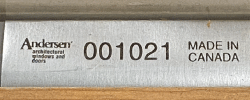To print this worksheet, please open the attached PDF document Andersen® Residential Entry Door Worksheet  .
.
The Identify a Complementary Product worksheet is designed to walk you through gathering the necessary information to identify your Andersen® product, accessories and features. We recommend that you follow the product identification process so that you may:
Purchase and receive the correct replacement part(s) for your Andersen product.
Locate the care and maintenance guide for your Andersen product.
Locate installation and/or replacement guides for your Andersen product.
For information on contacting us directly, see Contact Andersen® Windows and Doors.
View a brochure for our Handcrafted Premium Wood Entry Doors  .
.
| Step 1: Sill and Hinge Location |
|
Look at the entry door panel from the exterior of the building. Are the hinges visible from the exterior? Is the exterior clad? Do you see a flat low-profile sill?
|
 |  | | Exterior View - Clad Inswing and Outswing Door | Exterior View - Clad Inswing and Outswing Door |
|
|
Exterior hinges, clad exterior, and low-profile sills are all part of a commercial entry door.
|
| Step 2: Locate Product Identification Numbers |
|
Open the entry door and look at the hinge, do you see etching on the hinge?
If there is no hinge etching, check for an Andersen glass logo or metal glass spacer bar with a P-Number.
If there is no glass information, locate the Product ID label for a Serial Number.
 |  |  |  | | Hinge Etching | Glass Etching | Glass Spacer Bar | Product ID Label |
|
|
Once you have located an identification number, record the location and number on the line below.
Product Identification Location and Numbers: ________________________________
|
| Step 3: Visible Interior Glass Dimensions |
| From the interior of the home, please measure (in inches) the glass surface you can see and touch, also known as the unobstructed glass dimension. For additional information, please see How to Measure Glass in Your Andersen® Window or Patio Door. |
|
Record the width and height, including fractional dimensions, in the space provided below. (example: 67 ⅛")
Width: __________inches Height: __________inches
|
| Step 4: Unit Exterior Material |
|
Is the exterior of the unit wood or aluminum-clad?
|
 |  | | Wood Clad | Aluminum Clad |
|
| Step 5: Unit Handing |
|
In what direction does the door panel swing?
|
 |  | | Inswing | Outswing |
|
|
Step 7: Determine Interior and Exterior Color
|
|
Use the identification information below to determine the exterior color and interior finish of the entry door.
|
|
Exterior/Interior Colors: Plus 50 other colors.
|

|

|

|

| |
White
|
Canvas
|
Sandtone
|
Terratone
| |

|

|

|

| |
Prairie Grass
|
Red Rock
|
Cocoa Bean
|
Dark Bronze
| |

|

|

|

| |
Forest Green
|
Dove Gray
|
Black
|
Other
|
Interior Wood Species
|

|

|

|

| |
Pine
|
Oak
|
Maple
|
Cherry
| |

|  |

|

| |
Mahogany
|
Vertical Grain Douglas Fir
|
Alder
|
Mixed Grain Douglas Fir
|  |  |

|
| |
Walnut
|
Hickory
|
White Oak
|
|
|
|
Step 9: Grille Pattern
|
|
If your entry door has glass with grille bars, choose from the styles below.
|
|

|

|

|  | |
Colonial Style
|
Prairie Style
|
Specified Equal Light
|
Other / Custom Grilles
|
|
*Computer monitor limitations prevent exact color duplication. For an accurate representation of color options, please view actual color samples available at your Andersen window and patio door supplier. Additional colors and staining options may be available depending on the product.
©2025 Andersen Corporation. All rights reserved.
"FSB" is a registered trademark of Franz Schneider Brakel GmbH & Co.



